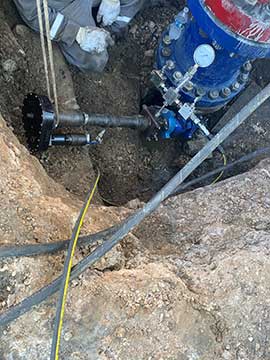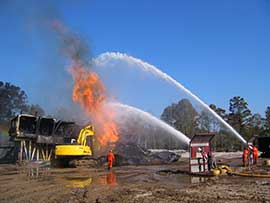Revamping During the Downturn
Excerpt from Permian Basin Oil and Gas Magazine - Dec. 20211
Cudd Well Control Vice President Dustin Locklear also observed that blowouts were down due to reduced drilling activity. Other services have fared better, however. “What we’ve been doing well on is the special service work: the hot tapping, the valve drilling, the freezes, lots of preventative measures like training, writing emergency response plans,” and more.
Immediately pre-COVID, in January of 2020, the company decided to reimagine and expand its well control service. They brought in Andy Ferguson as president of Cudd Well Control and Sam Bowden as vice president of Corporate Services for Cudd Well Control, along with Locklear, all of whom had long years of experience in the industry. They also hired about 15 of the best people from other companies, adding up to 800 years of total experience.
Next, they redesigned and remanufactured equipment they supply, and added new pieces to their offerings. A new, suitcase-sized hot tap unit is at the top of that list.

Behind the hot tap development was the realization that crowded pad-drilling sites required more compact tools, said Bowden. “It’s a very compact well base. You have wells that are very close together,” requiring smaller tools in order to access the well. The tool is “high pressure rated, but the real reason was some of these small cellars” at sites. Small size also allows it to be checked as luggage at an airport when a technician heads to a distant site. Some older units were so large they required an onsite crane for installation.
Generally a hot tap unit is called for when pressure must be released but a valve needed for that release is stuck shut. In that case the hot tap can safely drill a hole in the side for the installation of a new valve. Locklear explained that this is especially useful in plugging wells that were abandoned decades ago, whose valves have rusted shut. Some of those wells have no valves at all, only casing. A hot tap helps there as well.
The reboot came about with the help of RPC Inc. Cudd Well Control is a division of Cudd Pressure Control, which is a subsidiary of RPC. Ferguson said his goal upon assuming the GM reins was to improve the company’s people component. He recalled, “I met with Sam and with Dustin and we decided if we’re going to be in this business, we’re going to be in it for the long haul, and we’re going to have the best people, the best equipment. RPC let us do that.”
As the COVID shutdown hit a few weeks after that decision, Ferguson said, “It was either the worst timing or the best timing to do that.”
In the current environment, the market is picking back up, and all upgrades are ready for the increasing workload. With $75 oil and $5 per MMbtu natural gas they would like to see more business, but the market is also flooded with uncertainties that are holding back the implementation of new drilling projects.
One service on the rise is the plugging of abandoned wells, especially by the majors, Ferguson noted.
Locklear added, “Along with the plugging and abandonment comes the special service work—the hot taps, the valve drills. There are a lot of leaky wells around the United States. A lot of the majors are going in and fixing them now.”
Alliances with environmental companies allow Cudd to call them to remediate spills that result from blowouts, once the situation is stabilized.
SmartPhone App Arises During Downturn’s Quiet
“Another thing we did when we were all on lockdown,” said Ferguson, “[was that] we developed a Cudd Well Control app, available to anybody that wants it.”
When a customer has a wellsite event, that customer opens the app on their phone or smart device. The first thing that comes up is a button to click, which calls a Cudd well control expert. The screen also contains calculators for well control, coiled tubing, flange sizes, and other references. The app is also useful for quick access to non-emergency advice from Cudd personnel.

Well Control Insurance and Prevention
One new program is Cudd’s partnership with Worldwide Facilities, LLC, on an insurance program that covers up to $50,000 on services used in the first two days of a pressure control event. On the prevention side, it allows Cudd to offer rig surveys, training, and safety event drills.
In a separate program, Cudd now offers wellhead surveys wherein they test field equipment for wear and tear, rating sites on a scale from safe to dangerous. This can be done for drill, frac, or production sites. With all the advantages brought by total site automation, Locklear noted that there is one disadvantage. Some problems, potential or current, can only be detected by human eyes or direct evaluation. Site surveys, somewhat like a season preventive maintenance visit for a home HVAC system, make a site even safer.
Pad Drilling’s Effect on Well Safety
A blowout on a single-well pad is dangerous enough, but the recent trend toward multi-well pads has exponentially increased the safety issues to be considered. In that light, Cudd has recently completed two studies examining the potential impact when one rig on a pad has an issue—such as falling over onto another well or wells—and how that could cause additional emergencies. They have also studied the effects of radiant heat, and how heat from a fire on one well could ignite others.
For example, Bowden recalled, “Year before last, we were on a four-well pad where one well caught on fire and it simultaneously caught the next, and the next, and the next well on fire.”
From the studies the company has advised producers on pad redesign to reduce risk and to better accommodate emergency efforts.
The 21st century well control company spends much more time and effort in prevention and planning than in dramatic catastrophe control, although they are fully ready to do that when needed. As John Wayne’s shadow disappears in the distance, it’s replaced with the shadows of thousands of workers heading home safely at the end of a shift.
Less dramatic, maybe, but much more satisfying to the community.
Media contact:
Sandra Flores
Director, RPC Marketing
sflores@cudd.com
(281) 719-2935